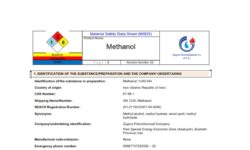The Remarkable Benefits of Single Super Phosphate
Single Super Phosphate (SSP) is a widely used fertilizer that plays a crucial role in modern agriculture. Its rich phosphorus content and additional nutrients make it an excellent choice for promoting plant health and enhancing crop yields. In this blog post, we will explore the numerous benefits of Single Super Phosphate and why it should be an essential part of your fertilization strategy.
Understanding Single Super Phosphate
Single Super Phosphate is produced by treating rock phosphate with sulfuric acid. This process results in a water-soluble fertilizer containing approximately 16% phosphorus, 12% calcium, and a small amount of sulfur. These components make SSP a balanced nutrient source for various crops, improving soil fertility and plant growth.
Key Benefits of Single Super Phosphate
1. Promotes Healthy Plant Growth
One of the primary benefits of Single Super Phosphate is its ability to promote healthy plant growth. Phosphorus is a critical nutrient for plants, playing a vital role in photosynthesis, energy transfer, and nutrient transportation. Adequate phosphorus levels ensure that plants can grow strong and robust, leading to better overall health and productivity.
2. Enhances Root Development
Strong root systems are essential for nutrient uptake and overall plant stability. Single Super Phosphate encourages root development, particularly during the early stages of growth. A healthy root system allows plants to access water and nutrients more efficiently, leading to improved resilience against environmental stressors such as drought or disease.
3. Increases Crop Yields
Farmers have reported significant increases in crop yields when incorporating Single Super Phosphate into their fertilization programs. Research has demonstrated that phosphorus enhances flowering and fruiting, resulting in larger and more abundant harvests. This is especially important for staple crops like corn, wheat, and rice, which are vital for global food security.
4. Improves Soil Fertility
Single Super Phosphate contributes to improved soil fertility through its nutrient content. The calcium and sulfur in SSP help to enhance soil structure and microbial activity. Healthy soil microorganisms are crucial for nutrient cycling and organic matter decomposition, leading to better nutrient availability for plants and overall soil health.
5. Cost-Effective Fertilization
Another advantage of using SSP is its cost-effectiveness. Its concentrated nutrient content means that farmers can achieve substantial results with smaller quantities compared to other fertilizers. This not only reduces input costs but also minimizes the risk of over-fertilization, which can harm the environment and lead to nutrient runoff.
6. Versatile Application Methods
Single Super Phosphate can be applied in various ways, including broadcasting, banding, and incorporation into soil. This flexibility allows farmers to tailor their application methods based on specific crop needs and soil conditions, ensuring maximum effectiveness and efficiency.
7. Suitable for Various Crops
SSP is suitable for a wide range of crops, including grains, legumes, fruits, and vegetables. Its balanced nutrient profile makes it an ideal choice for diverse agricultural practices, helping to meet the specific needs of different plants throughout their growth stages.
In summary, the benefits of Single Super Phosphate are numerous and significant. From promoting healthy plant growth and enhancing root development to increasing crop yields and improving soil fertility, SSP is a powerful tool for farmers and gardeners alike. Its cost-effectiveness, versatility, and suitability for various crops make it an essential component of sustainable agriculture. By integrating Single Super Phosphate into their fertilization strategies, growers can achieve healthier crops, greater yields, and a more sustainable approach to farming.


